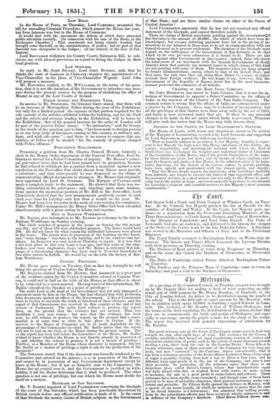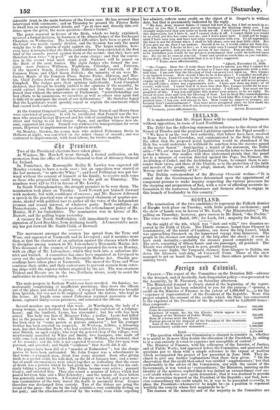4gbo grtrofolio.
At a meeting of the Common Council, on Tuesday, a report was brought up by Mr. Deputy Hale for sealing a deed of trust respecting an addi- tional gift of 1000 guineas by Mr. Henry Beaufoy, of Lambeth, to the City of London School, for prizes to be distributed among the pupils of the school. This is the fifth gift of equal amount by Mr. Beaufoy, who has in addition lately spent 10,000/. in building lagged Schools in Lam- beth. The birthday of Mr. Beaufoy is that of William Shakspere, and the terms of the deed regulating the distribution of the prizes declare that they are to commemorate the birth and genius of Shakspere, and espe- cially to encourage among the pupils a taste for the study of his works. The report was received with general expressions of admiration for Mr. Beaufoy.
The great revenue case in the Court of Exchequer seems scarcely half-way towards its end, after eight days of trial. The evidence for the Crown, if credible, establishes that breach of legal regulations, evasion of duties, and fraudulent abstraction of goods, each to the extent of many thousand pounds sterling a year, have been the rule in the London Docks. From fifteen to twenty witnesses, sonic of thorn servants of the Company for very long pe- riods, but now " subsisted " by the Customs, depose concurrently, that it has been a notorious practice of the Dock-officers to abstract from every mug° of sugar a quantity varying from half a ton to three or four tons, and in different ways appropriate it to the use of the Company, and pass it into their accounts. In particular, all the witnesses agree that there is an iniquitous place called Davis's Corner, where fine merchantable sugar was daily mixed with dirt, or washed down with water, to make refuse or molasses, for sale at a good profit to scum-boilers and refiners. These witnesses have been rigidly cross-examined ; and though some of them have proved to be men of unworthy character, their general testimony seems con- sistent and probable. Sir Fitzroy Kelly opened the defence on Monday, with a speech of six hours length, in which he undertook to prove that the cam in its broad features is a fabrication ; but admitted that trifling pecula- tons by the subordinate officers may have occurred, wholly unknown to and in defiance of the Company's directors. Chief Baron Pollock shows •edn.
siderable trust in the main features of the Crown case. He has several times intervened with comments; and on Thursday he pressed Sir Fitzroy Kelly to dwell less on unimportant details, and "go at once and directly into evi- dence upon the great, the main question—Davies Corner."
- The point reserved in favour of the Birds, which we lately explained, received a formal decision, by fourteen of the fifteen Judges of the Exchequer Chamber, on Wednesday. The technical difficulties have been so great that the Cola was nearly equally divided, and the decision has only the moral weight due to the opinion of eight against six. The larger number, how- ever, have determined that the Birds could not have been convicted at the first trial of the assaults proved against them at the second ; that they have not therefore been twice in peril" on the same charge; and that the convic- tion in the second trial must stand good. Sentence will be passed on the Birds at the next Assizes. The eight Judges who formed the ma- jority were Justices Williams, Wightman, Coleridge, and Patteson, of the Queen's Bench, Justices Erie, Talfourd, and Cresswell, of the Common Pleas, and Chief Baron Pollock ; the minority of six were Mr. Justice Maule of the Common Pleas, Barons Parke, Alderson and Mar- tin, Chief Justice Jervis of the Common Pleas, and the Lord Alderson, Justice Campbell. The Judges gave their opinions individually. Lord Campbell declared, that though he readily yielded to the opinions of the majority, he could extract from those opinions no certain rule for the future; and he feared that without the intervention of Parliament, "notwithstanding our best efforts to be unanimous, we ourselves as well as others may again find it difficult to anticipate the result of our deliberations." He therefore hoped that the Legislature would speedily repeal or explain the enactment which had caused such confusion.
At the Central Criminal Court, on Saturday, Jane Parnell and Henry Ogan were convicted of perjury. It will be recollected that Parnell was the wo- man who accused George Hopwood and his wife of assaulting her in the open street and trying to cut her throat. Ogan, and another witness now ab- sent, supported her story. Parnell was sentenced to transportation for seven years, Hopwood to imprisonment for eighteen months.
On Monday, Durden, the young man who stabbed Policeman Davis in Holborn at night, was convicted on the minor charge of assault ; and was sentenced to imprisonment, with hard labour, for twelve months.



























 Previous page
Previous page